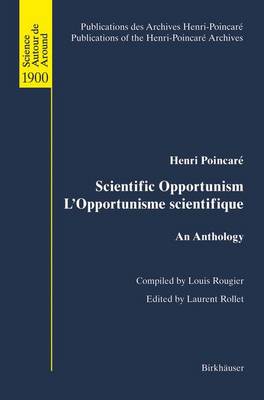Publications des Archives Henri Poincare / Publications of the Henri Poincare Archives / Science Autour de / Around 1900
1 total work
During his lifetime, Henri Poincare published three major philosophical books which achieved great success: "La science et l'hypothese" (1902), "La valeur de la science" (1905) and "Science et methode" (1908). After his death in 1913, a fourth volume of his philosophical works was published by his heirs as "Dernieres pensees" (1913). The four books constitute the core of Poincare's philosophic works and were given an ovation by scientific and general public. Around 1919, Gustave Le Bon wrote to Poincare's widow. As the director of the "Bibliotheque de Philosophie Scientifique at Flammarion", he asked her permission to publish a second posthumous volume. "L'Opportunisme scientifique" was intended to be the fifth and final volume of Poincare's philosophical writings. Louis Rougier had elaborated the project, with the collaboration of Gustave Le Bon, and the approval of the philosopher Emile Boutroux and his son Pierre. Because of the reservations of the mathematician's heirs, this book was never published and Dernieres pensees remained his last philosophical book.
Nevertheless Poincare's correspondence - which is kept in the Poincare Archives at University Nancy 2 - contains a large amount of documents concerning the project, its justification and the discussions between Louis Rougier and the mathematician's heirs. The aim of this book is to restore this episode, which gives some crucial informations about editorial practices of Poincare and about the posterity of his philosophic thinking.
Nevertheless Poincare's correspondence - which is kept in the Poincare Archives at University Nancy 2 - contains a large amount of documents concerning the project, its justification and the discussions between Louis Rougier and the mathematician's heirs. The aim of this book is to restore this episode, which gives some crucial informations about editorial practices of Poincare and about the posterity of his philosophic thinking.
